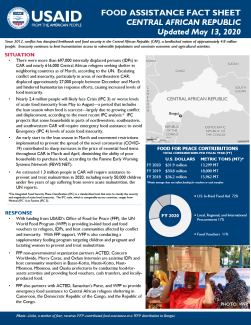May 13, 2020
Since 2012, conflict has disrupted livelihoods and food security in the Central African Republic (CAR), a landlocked nation of approximately 4.8 million people. Insecurity continues to limit humanitarian access to vulnerable populations and constrain economic and agricultural activities.
Situation
- There were more than 697,000 internally displaced persons (IDPs) in CAR and nearly 616,000 Central African refugees seeking shelter in neighboring countries as of March, according to the UN. Escalating conflict and insecurity, particularly in areas of northeastern CAR, displaced approximately 27,000 people between December and March and hindered humanitarian response efforts, causing increased levels of food insecurity.
- Nearly 2.4 million people will likely face Crisis (IPC 3) or worse levels of acute food insecurity from May to August—a period that includes the lean season when food is scarcest—largely due to growing conflict and displacement, according to the most recent IPC analysis.* IPC projects that some households in parts of northwestern, southeastern, and southwestern CAR will require emergency food assistance to avoid Emergency (IPC 4) levels of acute food insecurity.
- An early start to the lean season in March and movement restrictions implemented to prevent the spread of the novel coronavirus (COVID-19) contributed to sharp increases in the price of essential food items throughout CAR in March and April, diminishing the ability of poor households to purchase food, according to the Famine Early Warning Systems Network (FEWS NET).
- An estimated 1.3 million people in CAR will require assistance to prevent and treat malnutrition in 2020, including nearly 50,000 children under five years of age suffering from severe acute malnutrition, the UN reports.
*The Integrated Food Security Phase Classification (IPC) is a standardized tool that aims to classify the severity and magnitude of food insecurity. The IPC scale, which is comparable across countries, ranges from Minimal—IPC 1—to Famine—IPC 5.
Response
- With funding from USAID’s Office of Food for Peace (FFP), the UN World Food Program (WFP) is providing in-kind food and food vouchers to refugees, IDPs, and host communities affected by conflict and insecurity. With FFP support, WFP is also conducting a supplementary feeding program targeting children and pregnant and lactating women to prevent and treat malnutrition.
- FFP non-governmental organization partners ACTED, Concern Worldwide, Mercy Corps, and Oxfam Intermón are assisting IDPs and host community members in Basse-Kotto, Haute-Kotto, Haut-Mbomou, Mbomou, and Ouaka prefectures by conducting food-for-assets activities and providing food vouchers, cash transfers, and locally-produced food.
- FFP also partners with ACTED, Samaritan’s Purse, and WFP to provide emergency food assistance to Central African refugees sheltering in Cameroon, the Democratic Republic of the Congo, and the Republic of the Congo.
Food for Peace Contributions
Total Contributions:
| U.S. Dollars | Metric Tons | |
|---|---|---|
| Fiscal Year 2020 | $31.9 million | 13,299 MT |
| Fiscal Year 2019 | $50.8 million | 18,000 MT |
| Fiscal Year 2018 | $36.2 million | 15,962 MT |
* Metric tonnage does not reflect funding for vouchers or cash transfers.
Related Resources


